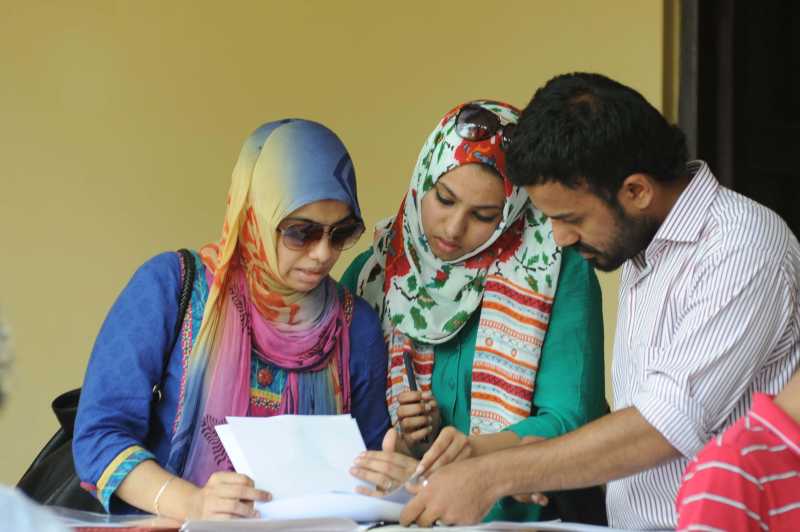Shradha Chettri says institutions across the national capital are offering courses to mould social entrepreneurs, medical experts and disaster management experts, to name just a few, as the rush for students from all over the country to study in Delhi continues.
 Fancy pursuing distinctive areas of study to create a niche for yourself? Institutions across the national capital are offering courses to mould social entrepreneurs, medical experts and disaster management experts, to name just a few, as the rush for students from all over the country to study in Delhi continues.
Fancy pursuing distinctive areas of study to create a niche for yourself? Institutions across the national capital are offering courses to mould social entrepreneurs, medical experts and disaster management experts, to name just a few, as the rush for students from all over the country to study in Delhi continues.
From courses like a masters in social entrepreneurship or early childhood care and development, an MBA in disaster management or a bachelors in rehabilitation therapy, audiology and speech language therapy to those in exotic languages like Pashto – all have been introduced to create experts in specific fields.
“Take childhood care and education – there is a major thrust for it after the national policy of 2013 on childhood care was formulated. This course will produce experts and in the process help in the implementation of the policy,” Venita Kaul, dean, School of Educational Studies at Ambedkar University (AUD), said.
The course, said Kaul, has been designed to suit the need of the policy as experts will be required at the district and state levels for childhood care after its formulation. The National Early Childhood Care and Education policy aims at developing a national framework for early childhood care and education and quality standards in the country.
“Even organisations like Unicef, Plan India and the World Bank have requirements of experts on childhood care. Now in the private sector, with pre-nursery and playschools growing, the need for childhood care is immense,” added Kaul.
The other courses introduced at AUD are MA in social entrepreneurship and M.Phil in development practice at the higher level.
“Social entrepreneurship is meant to produce entrepreneurs in the social sector. This course will produce job creators and teach students about basic business skills,” Kuriakose Mamkottam, director, School of Business Public Policy and Social Entrepreneurship at AUD, said.
Theory apart, students will also have to do two months of field work and prepare a plan for their entrepreneurial ventures that can be supported (with resources and finances) by AUD’s Incubation Centre or by a pool of venture capitalists.
For the M.Phil in development practice, students will spend eight of the 24 months of the course in the villages of Jharkhand, Odisha, Madhya Pradesh, Chhattisgarh, West Bengal, Rajasthan and Bihar in collaboration with NGO Pradan, which seeks to enable poor, rural families to lead a life of dignity.
“The M.Phil. in development practice answers questions of self and collective transformation by closely working with the community and creating action in the fields of livelihood, citizen’s and gender rights, health and environment,” Anup Dhar of the School of Human Studies at Ambedkar University, told IANS.
Admission to the course, which has 25 seats up for grabs, is through an entrance test followed by an interview.
This is not all, as even Guru Gobind Singh Indraprastha University has introduced new courses like a bachelors in audiology and speech language therapy and rehabilitation therapy and an MBA in disaster management.
“The audiology and speech language therapy course will help produce speech therapists for which there is a dire need in the country,” Nalini Ranjan, public relations officer of IP university, said.
According to Ranjan, the course, which not many universities offer, will help create experts in the field of speech therapy, of which there is an “acute shortage”.
At present, the course is available at the All India Institute of Medical Sciences and IP University.
Similarly, the four-year bachelors course in rehabilitation therapy is designed to prepare suitable manpower which can help provide the service at the district level where it is lacking at present, and also act as a first-level referral point at the grassroots.
“In addition, it can also take care of the training programmes of community workers at the grassroots level. The students are imparted knowledge about disabilities relating to locomotion and speech, hearing, visual and mental retardation,” added Ranjan.
The Master of Business Administration (MBA) in disaster management is a weekend programme which will provide insights into the different dimension of environmental disasters.
“The programme gives the students an opportunity to focus and apply their learning to their particular professional development needs. The MBA will develop critical evaluation skills and the application of key elements of business planning and management of risk and disasters,” Ranjan said.
The course has prospects of jobs with state and district disaster management authorities, as also with private firms in areas like emergency planning, risk assessment, community development, humanitarian aid and capacity building.
Apart from these courses, Jamia Millia Islamia has on offer an advanced diploma in Pashto – the native language of Pashtun people of South-Central Asia and one of the official languages of Afghanistan.
“As our university already had a diploma course in Pashto, an advanced diploma was started,” an official at the Department of Persian said.
The admission to the course is available through an entrance test and it is a must for students to have a diploma in the language.